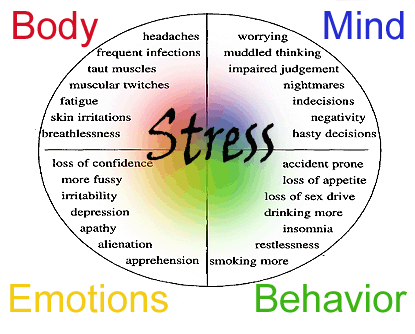Stress symptoms can affect your body, your thoughts and feelings, and your behavior. The constant stress our bodies are under inhibits the body’s ability to return to equilibrium or homeostasis. Chronic stress can cause headaches, muscle pain, fatigue, insomnia, digestive problems, infertility, and a variety of emotional conditions.

Research into chronic stress has shown that: STRESS is a prime factor in more than 75% of medical conditions. STRESS ages you biologically, mentally and physically. Cortisol is released in the fight or flight response, when you become stressed. When we are constantly exposed to STRESS and anxiety, whether it is real or imagined, your health and wellbeing become compromised.

Being able to recognize common stress symptoms can help you manage them.
Stress that’s left unchecked can contribute to many health problems, such as high blood pressure, heart disease, obesity and diabetes.
Aim to find active ways to manage your stress. Inactive ways to manage stress — such as watching television, surfing the internet or playing video games — may seem relaxing, but they may increase your stress over the long term.
And be sure to get plenty of sleep and eat a healthy, balanced diet.
Avoid tobacco use, excess caffeine and alcohol etc.
-
STRESS hinders your ability to lose weight, especially around the ‘middle’.
-
STRESS makes you crave sugar, carbohydrates and addictive substances
-
STRESS weakens your energy levels
-
STRESS interrupts healthy sleep
-
STRESS lowers your immunity
-
STRESS causes poor digestion and inflammation
-
STRESS leads to disease
-
STRESS accelerates wrinkle formation
-
STRESS inhibits the body’s ability to repair wrinkles
-
STRESS breaks down muscle tone
-
STRESS causes skin dehydration

